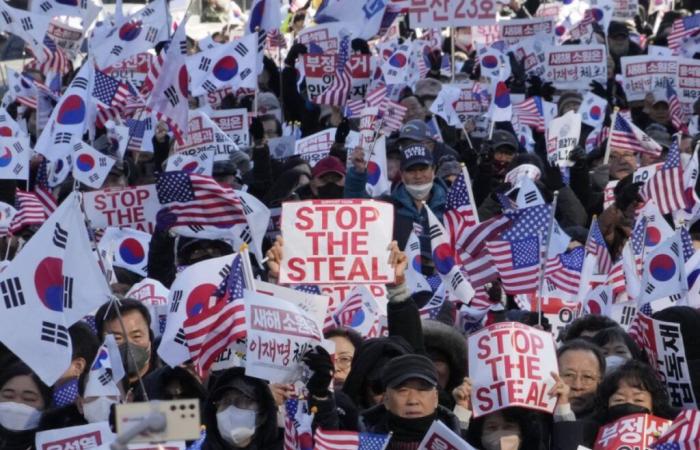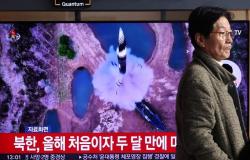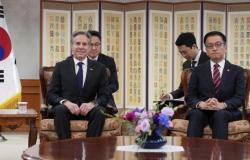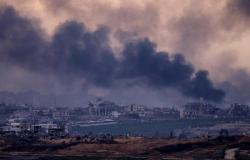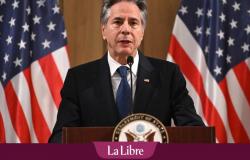Keystone-SDA
Thousands of South Koreans demonstrate in the streets of Seoul on Saturday in an increasingly chaotic political context, after the unsuccessful attempt to arrest ousted President Yoon Suk Yeol, accused of “rebellion” for trying to impose the law martial.
This content was published on
January 4, 2025 – 10:33
(Keystone-ATS) Detractors and supporters gathered separately, on avenues in the capital and in front of Mr. Yoon’s home, some demanding his arrest and others the annulment of his dismissal voted by the National Assembly.
“If President Yoon is removed and Lee Jae-myung (the leader of the opposition, editor’s note) becomes the new president, our country could be threatened with ‘+communization’ and absorption by North Korea (…) . I can’t let it happen,” Jang Young-hoon, a 30-year-old pro-Yoon, told AFP.
In the camp opposite, the largest South Korean union (KCTU) had undertaken a march towards the residence of Yoon Suk Yeol but was blocked by the police, reporting two members arrested and several injured.
Cloistered at home
The day before, soldiers and security services blocked investigators who came to the 64-year-old former star prosecutor to take him away, the operation launched early in the morning having been canceled after around six hours of fruitless negotiations and tensions.
An arrest of Yoon Suk Yeol would be the first of a sitting head of state in the country’s history, as he officially remains the president pending the Constitutional Court confirming or overturning his dismissal, adopted by MPs on the 14th. December.
Suspended from his functions since, cloistered at his home, Mr. Yoon is accused of having shaken the young South Korean democracy on the night of December 3 to 4 by proclaiming martial law by surprise, a coup which revived the painful memory of the military dictatorship.
Choi’s support requested
In Parliament, surrounded by soldiers, a sufficient number of deputies managed to come together to vote on a motion demanding the lifting of this state of exception. Under pressure from the Assembly, thousands of demonstrators and constrained by the Constitution, Yoon Suk Yeol had to repeal it a few hours after having declared it.
The unpopular leader stripped of his powers is the target of several investigations, including one for “rebellion”, a crime theoretically punishable by death.
On Friday, the investigators who centralized the investigations into him, despite having a warrant, were defeated by some 200 soldiers and presidential guards. They left empty-handed around 1:30 p.m. (5:30 a.m. in Switzerland), under the eyes of hundreds of pro-Yoon supporters.
“There were minor and major physical altercations” between the two camps, said an official from the Office for the Investigation of Corruption of Senior Personalities (CIO).
The agency has until Monday to execute the arrest warrant issued by the court to force Mr. Yoon to answer questions about his attempt to impose martial law.
The issuance of this document already represented a first for a sitting South Korean president.
Investigators will be able to request a new one if the first expires without being applied.
They also called on interim President Choi Sang-mok to support the current mandate, in a statement released on Saturday.
Constitutional trial on January 14
For its part, the Constitutional Court set January 14 for the opening of the impeachment trial against Yoon Suk Yeol, which will continue its course even without him. The court must rule by mid-June.
Mr. Yoon has so far rejected all summons in connection with his coup and his guard has repeatedly obstructed searches, even though on warrant.
On Saturday, two people responsible for his protection refused to appear before the police, according to a press release from the presidential security service sent to AFP, citing the “serious” nature of their mission.
Mr. Yoon’s lawyers, for their part, denounce an “illegal” arrest attempt and have promised to initiate proceedings to challenge it.
The suspended president still defends his shock decision at the beginning of December despite the serious political disorder it caused, the first interim president having also been dismissed before Choi Sang-mok took office.
In a letter distributed Wednesday to his most radical supporters, in numbers outside his home, Mr. Yoon promised to “fight until the very end,” repeating his attacks against internal and external elements “threatening” South Korea. South which he had already formulated by declaring martial law.
In the midst of the crisis, the head of United States diplomacy, Antony Blinken, is expected in the country on Monday to meet his counterpart Cho Tae-yul and “reaffirm the unshakeable alliance” between Washington and Seoul, according to the Department of Defense. American state.
Discussions should also focus on the ongoing unrest and the security threat posed by neighboring North Korea.

